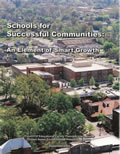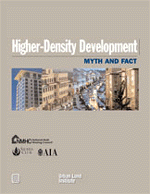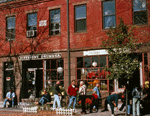 Smart Traveler
Smart TravelerShaquania Andrades, an eager-to-learn third-grader, arrives by bike at the B.F. Norton Elementary School in the Valley Falls section of Cumberland, RI.
The school, originally built in 1890, underwent a complete reconstruction in 1994.
|
|
|
Grow Smart Board of Directors
Michael F. Ryan
Chairman of the Board
Susan Arnold
William Baldwin
S. James Busam
Joseph Caffey
Robert L. Carothers
Arnold Chace
Jen Cookke
Trudy Coxe
Peter Damon
Stephen J. Farrell
Thomas E. Freeman
J. Joseph Garrahy
John R. Gowell, Jr.
Stephen Hamblett
Robert Harding
Michael S. Hudner
Stanley J. Kanter
Howard M. Kilguss
Thomas A. Lawson
Dennis Langley
James Leach
Roger Mandle
Rev. James C. Miller
Thomas V. Moses
George Nee
B. Michael Rauh, Jr.
Gary Sasse
Richard Schartner
Deming Sherman
Merrill Sherman
Curt Spalding
James F. Twaddell
Ranne Warner
Sandra Whitehouse
Frederick C. Williamson
W. Edward Wood
Board Listing with
Affilliation
|
Help Grow Smart help you stay informed

Become an e-Brief Sponsor

Looking for a past issue?

Want to join an expanding network of smart growth practioners? Click the map for details

Grow Smart Staff
Scott Wolf Executive Director
Sheila Brush
Director of Programs
John Flaherty
Director of Research & Communications
Lynn Burns
Office Manager / Executive Assistant
Dorothy Dauray
Office Assistant
Linsey Cameron
Research Assistant
|
| |
Dear John,
You're among the 2,675 opinion leaders,
state & local officials, development professionals,
journalists and visionary citizens getting the latest
news, happenings and trends in the smart growth
movement from Grow Smart
Rhode Island.
|
| |
| |
| |
| State urges school districts to plan smarter |
| |

RI Department of Education promotes 'Smart
Growth' principles in school facility planning
guidelines
As a new school year gets underway, communities
applying for school construction aid in Rhode Island
will find a new emphasis on building guidelines that
promote smart growth concepts and that ask school
districts to consider the impact of sprawl in planning
for school space needs.
These guidelines, which encourage renovation of
existing facilities where feasible and the siting of new
schools away from remote locations and closer to
neighborhoods where more children can walk, were
originally adopted in 2002 following a recommendation
of the Governor's Growth Planning Council. [More]
Read the
related editorial by the Providence Journal -
9/14
|
| |
|
| |
| New publication helps communities plan smarter |
| |

Schools for Successful Communities: An Element
of Smart Growth explains why and how
communities can employ smart growth planning
principles to build schools that better serve and
support students, staff, parents, and the entire
community.
When school districts collaborate with community
leaders to find a location for a school, the community
benefits socially, environmentally, and economically.
This booklet, published by the Council for Educational
Facility Planners International (CEFPI) and the U.S. EPA, helps communities invest in schools
that will give children the best possible education,
use taxpayer dollars wisely, and improve the quality
of life for all citizens.
Click here to find out how to get a free
copy
|
| |
|
| |
| FEDs to help pay for sidewalks, paths, traffic calming |
| |

New program will pay 90% of project costs to
improve safety near schools
As part of the far-reaching federal transportation
spending package approved by Congress and signed
by the President on August 10, 2005, the new
federal Safe Routes to School Program aims
to invest $612 million over five years to improve the
safety of children walking or bicycling to school. The
program will be administered locally by RIDOT.
According to
AmericaBikes.org, the number of children walking
or bicycling to school has declined dramatically in
recent decades, increasing school busing costs as
well as traffic congestion. Public health officials say
children need to get more physical activity: since the
1970s, the percentage of obese children 6 to 11
years old has tripled. At the same time, motor
vehicles are the leading cause of death among
children 4 to 14 years old. [More]
|
| |
|
| |
| Wolf helps guide merger of 2 national smart growth groups |
| |

As President of the Washington, DC based Growth
Management Leadership Alliance (GMLA), Grow Smart
Rhode Island Executive Director Scott Wolf recently
sealed an agreement to merge the GMLA with Smart
Growth America.
GMLA has
served as the professional association for
state and regional organizations that carry out
programs to directly shape and implement smart
growth policies and actions in the United States and
Canada. Smart
Growth America is a coalition of some
of the best-known national and statewide
organizations advocating on behalf of historic
preservation, the environment, farmland and open
space preservation, neighborhood revitalization and
more.
According to Wolf, "The merger will strengthen the
smart growth movement by linking national resources
more closely with the drive for policy reform at the
state and local levels."
|
| |
|
| |
| Higher Density Development: Myth & Fact |
| |

No one likes sprawl and the traffic congestion it
creates; yet proposals for increasing density in new
and existing neighborhoods are often squashed by
community fears of public housing, crime, and ugly
high-rises. Higher Density Myth and Fact dispels
these negative stereotypes, by comparing the
advantages and drawbacks of higher and low-density
development.
Published by the Urban Land Institute, the report
examines eight widespread misconceptions about
higher-density development and dispels them with
well-researched facts and examples of quality,
compact developments.
Available in packets of 10 for $19.95 from the ULI bookstore.
Grow Smart Rhode Island will provide a FREE
copy to the first ten people that request one.
Email
us to request a free copy.
|
| |
|
| |
| New Urbanism for New England? |
| |

Tools for Planners, Developers and Architects
Many New Englanders respond to New Urbanism by
exclaiming, “Who needs New Urbanism? We have
authentic old urbanism!” Unfortunately, our
treasured urbanism is no longer sufficient. Our cities,
villages, hamlets and countryside are under attack by
development and code trends of the last 50 years
that debase the very places we treasure.
This article, by town and building design consultant
Bill Dennis, reviews the misunderstandings about
what New Urbanism is (only for the rich, only about
porches, all about artificial exclusive and upper
middle-class gated communities, just for greenfields,
not practical, won’t work here because we’re
different, etc.). [More]
Congress on
New Urbanism - New England Chapter
|
| |
|
| |
| Form Based Codes: Implementing Smart Growth |
| |

New 8-page Fact Sheet from the Local
Government Commission
Form-based codes have become an increasingly
popular approach to reforming zoning codes and
creating communities where people want to live,
work and play. Form-Based Codes: Implementing
Smart Growth from the Local Government Commission
is an eight-page fact sheet that discusses this
innovative approach to regulating development and
includes case studies and tips for preparing and
administering a form-based code.
This publication provides a quick definition of
form-based codes and provides examples of why
such codes are effective. Steps for how a community
can prepare a form-based code are provided, along
with examples of form-based codes from other
communities. [More]
Download the Fact
Sheet (8 pages/3.9mb)
|
| |
|
| |
| CALENDAR |
| |

Wednesday, September 21
Thursday, September 22 (5:00p -
8:30p)
Presented by Grow Smart and other partnering
organizations, these workshops are intended to help
municipal officials understand the purpose of housing
trust funds and community housing land trusts.
Registration and supper are complimentary.
Registration is required by COB on Monday,
9/19.
Warwick and Newport
October 3-7
Gives children, parents, school teachers and
community leaders an opportunity to be part of a
global event as they celebrate the many benefits of
walking. In 2004, approximately 3 million walkers from
36 countries walked to school together for various
reasons – all hoping to create communities that are
safe places to walk.
Friday, October 14
Conference: November 9-10, 2005. Workshops
include Placemaking in New England, Form-Based
Codes, Housing Affordability, Using TDR to Manage
Growth and Preserve Open Space, Planning for
Successful Mill Reuse in Your Town, Smart Growth
Planning, Rural / Suburban
Transit-Oriented Development.
Newport
|
| |
|
| |
| Job Postings |
| |

Grow Smart is pleased to introduce a new service
beginning this month. On a space available basis, we
will post positions related to smart growth and land
use. The service will be available on a
complimentary basis for a trial period. Organizations
interested in posting a job opening must provide a
link to further information. Email your
listing to us
|
| |
|
| |
| Growth and development in the news |
| |

National
Statewide
Barrington
Block Island
Bristol
Charlstown
Coventry
Cranston
Cumberland
Foster
Hopkinton
Jamestown
Middletown
Narragansett
Newport
North Smithfield
Pawtucket
Portsmouth
Providence
Arts district gains more
ground
Scituate
Smithfield
South Kingstown
Tiverton
Warren
Warwick
Westerly
West Greenwich
West Warwick
Woonsocket
Worcester, MA
|
| |
|
| |
|